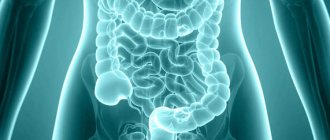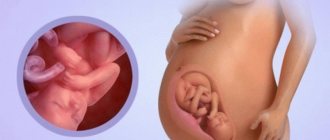The onset of pregnancy is an important and joyful period in the life of every woman.
The first trimester is the most crucial time for the entire pregnancy, as the woman’s body is actively restructuring and experiencing stress. It is important to remember and be aware of the key points to ensure that the pregnancy proceeds well and without complications. The first trimester of pregnancy lasts from the first day of the last menstruation until the 13th week (according to the obstetric period).
Symptoms
Soreness of the mammary glands.
From the very moment of conception, the mother’s body prepares for the pregnancy and birth of the baby. Physiological changes in the mammary glands can be noted almost immediately; the restructuring is due to upcoming breastfeeding. One of the first symptoms of pregnancy that a woman notices is breast tenderness. This is due to hormonal changes in the body and tissue stretching. Estrogens and progesterone begin to actively affect the mammary gland, and the level of hCG in the blood increases. During this period, the breasts become not only painful, but also more sensitive. Increased blood flow contributes to the appearance of visible vascular networks on the chest.
This symptom often appears even before the expectant mother finds out about pregnancy.
Bloody and milky white discharge
Bloody discharge can be either normal or a reason for urgent medical attention.
Small uterine bleeding (about 2 ml) is accompanied by the process of fetal implantation, which occurs 7-9 days after fertilization of the egg. The fertilized egg (zygote) begins to move along the fallopian tube to the uterine cavity, entering the adhesion stage. As soon as the fertilized egg begins to sink into the endometrial layer, invasion occurs. After the invasion is completed, slight bleeding is possible, which is facilitated by destroyed endometrial cells and damaged small vessels. As a rule, such discharge does not last longer than one day. If the discharge is prolonged, you should immediately consult a doctor.
The appearance of milky white discharge is very often physiological in nature, in some cases it is a pathology. In most cases, leucorrhoea is formed due to hormonal changes in the body. There is no need to worry if the discharge does not have a specific odor, there is no itching or pain. You should be wary if the discharge is foamy, liquid or cheesy in consistency, has a pungent odor, itching or pain, or is mixed with other shades of discharge.
Constipation
With the onset of pregnancy, constipation may occur, this is due to the fact that an increased concentration of progesterone is produced. In turn, this starts the process of relaxation of the uterus and intestines. If this is added to a sedentary lifestyle, poor nutrition and improper drinking regimen, the functioning of the gastrointestinal tract is disrupted, and constipation is observed. If you suffer from constipation, first of all, you should improve your diet, drink more water, and walk every day. If the problem does not resolve, you should definitely consult a doctor, and under no circumstances should you start taking laxatives without consulting a specialist!
Fatigue
Fatigue and drowsiness are an absolutely normal physiological reaction of a woman’s body to pregnancy. The fact is that most of the energy begins to be spent on the synthesis of proteins, which form the basis of new cells. Of course, a lot of effort goes into developing the fetus and adapting the body to new living conditions. That is why a woman may notice fatigue not only in the evening, but also in the first half of the day.
Heartburn
When heartburn occurs, unpleasant sensations appear in the upper abdomen: burning sensation, pain and heaviness. The trigger for heartburn in the first trimester of pregnancy is the same progesterone. It relaxes the esophageal sphincter, which acts as a valve and is responsible for preventing gastric contents from entering the esophagus.
Another reason is an enlarged uterus. An enlarged uterus increases intra-abdominal pressure, which causes compression of the stomach, resulting in reflux of stomach contents into the esophagus.
In addition, heartburn may indicate the presence of certain diseases, such as gastritis, pancreatitis, cholecystitis, peptic ulcer and others.
In any case, it is worth telling your doctor about the presence of heartburn, the specialist will identify the cause and prescribe symptomatic treatment. Again, you should not resort to independent medication or alternative treatment.
Nausea
Nausea is a symptom of toxicosis. During the normal course of pregnancy, nausea occurs due to changes in dietary preferences, neurohumoral changes and intolerance to certain odors. This symptom is caused by hypersensitivity of smell; familiar smells begin to cause disgust. Nausea may be a precursor to vomiting, but may occur on its own.
Frequent urination
When pregnancy occurs, a woman begins to experience a frequent urge to urinate; the frequency of trips to the toilet can reach up to 20 times a day. Frequent urination is also an option for the body to adapt to a “new” state. As soon as a woman becomes pregnant, human chorionic gonadotropin begins to be produced, which helps to increase urine output. Progesterone has a relaxing effect on the bladder, causing it to empty more frequently.
Another reason for frequent urination is increased blood flow to the pelvis, the bladder becomes more sensitive, so there is a need to visit the toilet.
As the uterus enlarges, the pressure on the bladder increases, which also leads to frequent urination.
Delayed menstruation (missed menstrual cycle)
If the menstrual cycle is regular, lasts on average 28 days, ovulation occurs and occurs on days 14-15, then the absence of menstruation on time may indicate pregnancy.
The delay is due to the fact that after conception the hormone hCG (human chorionic gonadotropin) begins to be produced, which maintains the normal course of pregnancy and prevents the egg from maturing in the next cycle. Accordingly, the expected menstruation does not begin. Other symptoms of pregnancy in the early stages may not yet appear if there is a delay.
It is worth noting that a missed period is not always the first sign of pregnancy. With an irregular cycle, nervous strain, or past illnesses, such cycle disturbances may indicate other processes in the body. Delay may also result from discontinuation of oral contraceptives.
To avoid guessing and worrying once again, you should use a home test to determine pregnancy in the early stages. Most of them will show pregnancy within 8 days after the missed cycle. An option for finding out if a woman is pregnant without a test is to donate blood for hCG in a laboratory.
Clue
- Take a pregnancy test.
- If the result is positive, make an appointment with your doctor.
- If you are taking any medications, ask your doctor if they are dangerous for you and your baby.
Make an appointment
Another important point - in the first trimester, bleeding may occur, which can be mistaken for menstruation. Because of this, women do not notice pregnancy in the early stages, especially if there are no unusual sensations.
First trimester - stages of child development
At the moment when the embryo appears, it is already two weeks old, since the obstetric period is counted from the first day of the last menstruation. The true term begins to count immediately after pregnancy.
The end of the second - the beginning of the third week of pregnancy. At this stage, the chromosome set of the unborn child is formed, which determines eye color, gender and other characteristics. Next comes the period of implantation, when the embryo is implanted into the uterus.
Week 4. The size of the baby is a small grain. At this stage, the laying of the baby’s organs and tissues occurs.
Week 5. Size – 3-4 mm. At this stage, the formation of the neural tube occurs. Folic acid is necessary for the normal formation of the neural tube, so pregnant women are recommended to consume this vitamin.
Week 6. Size – 5-7 mm. The formation of the intestines begins, the rudiments of arms and legs appear.
Week 7. Size – 1.3 cm. Interdigital spaces appear, arms and legs continue to form, ears and nose appear.
Week 8. Size – 1.6 mm. Facial features and internal organs are actively formed, fingers and eyelids appear, the brain is divided into three parts.
Week 9. Size – 2.3 cm. The rudiments of the tongue and teeth appear, the neck is visible, the wrist and ankle joints are formed, the diaphragm is formed, and the heart valves are formed. The circulatory and reproductive systems develop.
Week 10 Size - 3 cm. The skull is actively growing, the stomach and intestines produce digestive juices, the liver produces bile, the pancreas produces insulin, the genitals take on a shape characteristic of the sex. The sucking reflex develops.
Week 11 Size - 4 cm. The growth of medulla cells, the differentiation of the central and peripheral nervous systems occurs, the grasping reflex develops, the heart completes its development, the liver grows.
Week 12. Size – 5.3 cm. Active development of the brain, the beginning of the production of hormones by the pituitary gland, red bone marrow produces white blood cells, kidneys produce urine.
Weight gain
Weight gain becomes noticeable towards the end of the first trimester. The gain can range from 500 grams to 2 kilograms in the first few months. Early pregnancy calorie needs are not much different from normal, but they will increase as pregnancy progresses.
At later stages, the weight is distributed as follows:
- chest (from 500 grams to 1.5 kilograms);
- uterus (about 1 kilogram);
- placenta (about 500 grams);
- amniotic fluid (about 1 kilogram);
- increased volume of blood and fluid (about 2-3 kilograms);
- fat (from 2.5 to 4 kilograms).
Make an appointment
Pregnant uterus
In place of the mature follicle, a corpus luteum is formed; it produces estrogens and progesterone. Estrogens contribute to the thickening of the muscular layer of the uterus, the blood vessels dilate, and blood flow to the uterus increases.
Progesterone promotes enlargement of the uterus and reduces the activity of the uterine muscles. In the 1st trimester of pregnancy, the uterus increases to 8-12 cm.
Frequent urination and urinary incontinence
During pregnancy, the volume of blood in the circulatory system increases, so more urine is released. At the same time, the pressure of the uterus on the bladder increases. The changes may result in a frequent urge to go to the toilet or spontaneous leakage of urine.
Clue
- To avoid getting into an unpleasant situation, use special gaskets.
- Don't give up drinking. Drink enough water, you can even increase your daily volume by 300 ml.
- Don’t be impatient and don’t put off going to the toilet—it’s better to go there in advance.
Possible complications in the 1st trimester of pregnancy
Toxicosis.
Due to changes in the hormonal system and metabolism, a pregnant woman may develop toxicosis. As a rule, toxicosis begins at 5 weeks and goes away by 14-18 weeks; late-term toxicosis requires the attention of doctors.
- Mild degree: slight nausea in the morning, weakness.
- Moderate degree: gagging, vomiting up to 10 times a day, weight loss, weakness.
- Severe: vomiting occurring every 1-2 hours, resulting in dehydration.
To reduce the manifestation of toxicosis, you should avoid foods and odors that provoke the development of toxicosis, and drinking regime is important. The presence of toxicosis must be reported to the leading physician.
Ectopic pregnancy.
An ectopic pregnancy is the attachment of a fertilized egg in the fallopian tube, on the surface of the ovary, in the cervical canal of the uterus, or even in the abdominal cavity. In the first weeks, an ectopic pregnancy is no different from a normal one; it begins to manifest itself 3-8 weeks after the last menstruation.
Symptoms: spotting, pain, possible heavy bleeding or spotting, shock.
Frozen pregnancy.
Frozen pregnancy is the cessation of growth and development of the fetus. Symptoms: spotting, weakness or improvement, sudden interruption of toxicosis (if any), fever. There are no characteristic signs of a frozen pregnancy, but these symptoms may indicate its presence, so you should consult a doctor immediately.
Cramps, discharge
Changes in the female body occur from the first week of pregnancy, but the signs of these changes are not always specific. For example, discharge and cramps that are caused by the attachment of the embryo to the uterus:
- During the first 5-6 days from the moment of conception, a blastocyst develops - several hundred cells at the preimplantation (before implantation) stage of embryo development. In the future, these cells will form the child’s organs.
- After 10-14 days (approximately 4 obstetric weeks), the blastocyst is implanted into the endometrium (the mucous tissue lining the inside of the uterus). During implantation, bleeding may occur, which makes it difficult to recognize pregnancy in the early stages - the sensations are close to those during menstruation.
The duration of implantation bleeding is less than during menstruation. Usually the discharge ends within 1-2 days. The discharge has features that are taken into account when determining pregnancy in the early stages.
Make an appointment
4 common signs of implantation bleeding:
- Pain.
The pain can vary in intensity, from mild to severe. A study was conducted among 4,539 women, which showed that in 28% of study participants, discharge was accompanied by pain. - The color of the discharge
varies from pink or red to brown. This is fine. - Bleeding.
The intensity of the discharge is most often compared to regular menstrual flow. - Episodes.
Bleeding during embryo implantation normally lasts no more than 3 days. It is not a reason for treatment or concern.
The cramps that can accompany implantation bleeding are similar to menstrual cramps, so many women mistake these sensations for a normal period.
In addition to bleeding, a pregnant woman may have white or milky discharge, which is associated with the growth of cells lining the vagina. Such discharge may be present throughout pregnancy.
Advice.
If there is a burning sensation, itching, or an unpleasant odor from the discharge, you should consult a doctor. The changes may be due to an infection that requires treatment.
Visit doctor
When to register.
Early registration – up to 12 weeks. But a woman may appear later, but a late statement can lead to undesirable consequences, so you should not delay it.
What tests to take.
When registering, the following tests are required: vaginal smears, syphilis, HIV, hepatitis, infectious diseases that can be transmitted to the fetus. Additional tests: hormones, urine culture, amniocentesis.
The Ministry of Health recommends taking the following tests: microbiological examination of urine, blood group and Rh factor, CBC, coagulogram, thyroid-stimulating hormone, OAM, smear from the surface of the cervix and cervical canal.
High blood pressure and dizziness
From the first week of pregnancy, one of the signs may be dizziness. It is caused by dilation of blood vessels and a decrease in blood pressure.
High blood pressure (BP) is more difficult to determine during early pregnancy. An increase in blood pressure is not always accompanied by any sensations. But almost always, hypertension up to 20 weeks is not associated with the fact that the woman is pregnant. More often than not, this is a symptom of some kind of health problem.
Your doctor will help you determine your basic blood pressure readings at your first appointment. He will also give recommendations on maintaining normal values.
Clue
- If there are no contraindications, do physical exercises recommended for pregnant women.
- Follow your doctor's advice to control your blood pressure. Find out how to take measurements correctly and what to do in case of deviation from the norm.
- Ask your doctor about which foods to include in your diet and which to avoid to help stabilize your blood pressure.
- Maintain drinking regime. Avoid sudden movements. Try to bend over or stand up calmly and smoothly.
Make an appointment
Complications during pregnancy
The most common ailments.
- Lack of sexual desire.
- Heartburn.
- Nausea.
- Constipation.
- Increased appetite.
- Frequent changes in mood.
- Weakness and drowsiness.
- Increased pigmentation.
- Pain in the mammary glands.
- Dizziness.
In what cases should you immediately consult a doctor?
- Severe pain in the lower abdomen.
- Bloody issues.
- Fainting.
- Pain when going to the toilet.
- Frequent vomiting.
- Increased blood pressure.
- Increased swelling.
- Leakage of amniotic fluid.
- Discharge with a pungent odor.
- Spotting.
What medications should you not take?
Is it possible to take medications during the first trimester of pregnancy? Any medications can be taken only after consulting a doctor, but there are medications that should absolutely not be taken.
These include:
- antibiotics from the group of tetracyclines, fluoroquinolones;
- antifungal drugs;
- antihistamines;
- drugs that increase blood pressure;
- analgesics;
- antidepressants.
Fatigue
What other sensations are most often noted during early pregnancy? This is fatigue, lethargy and drowsiness. They can appear at any time, and this is quite normal. But at the very beginning, many women notice that they often want to lie down and it becomes more difficult to wake up.
This condition may be associated with several factors: an increase in the level of the hormone progesterone, a decrease in blood pressure, an increase in blood production, and a decrease in blood sugar concentration.
Clue
- Try to get enough sleep and follow a routine.
- Walk outside more and regularly ventilate the rooms you are in. Before going to bed, try to ventilate the bedroom.
- Add foods high in iron and protein to your diet.
Make an appointment
Physical exercise
1st trimester of pregnancy: what is possible?
Of course, pregnancy is not a disease, so you shouldn’t give up activity. Daily walks, swimming, and “light” sports will only benefit both the mother and the unborn baby. But in some cases, for example, if there is a threat of miscarriage, it is worth leading a less active lifestyle. You should consult your doctor regarding physical activity.
In the first trimester of pregnancy, the body adapts to its new status, and the woman faces many difficulties. But still, pregnancy is a wonderful time!
Share on social media networks
Nausea and vomiting
If we talk about what sensations during early pregnancy cause the most discomfort to women, then these are nausea and vomiting. They usually appear in the morning (morning sickness), starting at 4-6 weeks. For some women, unpleasant symptoms may appear both during the day and in the evening.
There is no exact scientific explanation for morning sickness, but it is attributed to the action of hormones. The intensity of sensations changes. In the first trimester, nausea can be mild or severe, but it usually intensifies towards the end of the trimester (by week 12), and in the first half of the second trimester, the unpleasant symptoms weaken or disappear completely. There are cases when ailments continue throughout pregnancy, but still their intensity decreases.
Some pregnant women may experience changes in their taste preferences. You may want some foods that were not previously present in your diet. Or vice versa, your favorite dishes can cause rejection.
Clue
- Before you get out of bed in the morning, eat a few saltine crackers. Prepare them in advance, the evening before. Lie down for a few minutes, only then slowly get up.
- Drink more water. When vomiting, the body loses fluid; if the water balance is not replenished, dehydration may occur, which can have negative consequences for mother and baby. Therefore, it is extremely important to maintain a drinking regime.
- Call your doctor if you are unable to keep fluid down in your stomach. This point follows from the previous one. The specialist will take measures to prevent dehydration.
It is equally important to balance your diet so that the body receives all the necessary substances. To avoid vomiting, it is better to eat small portions 4-5 times a day. Your doctor will help you create a menu.
Good to know.
Morning sickness and vomiting are symptoms of pregnancy in the early stages with a delay, which, perhaps, everyone knows about. But they are not found in every woman. At the very beginning, pregnancy may occur without symptoms.









